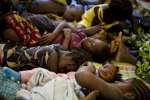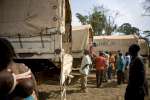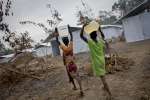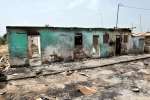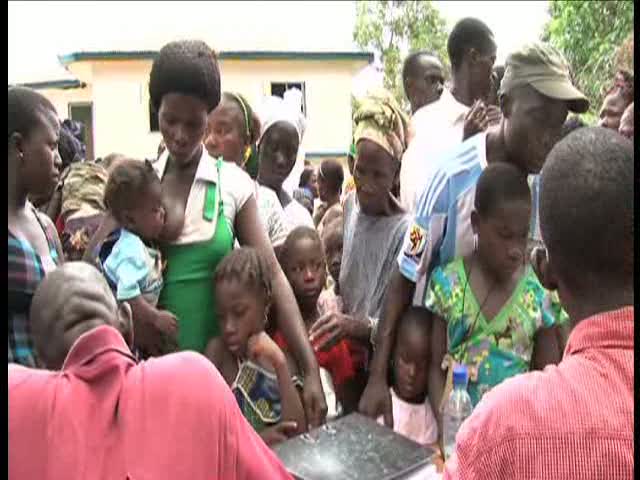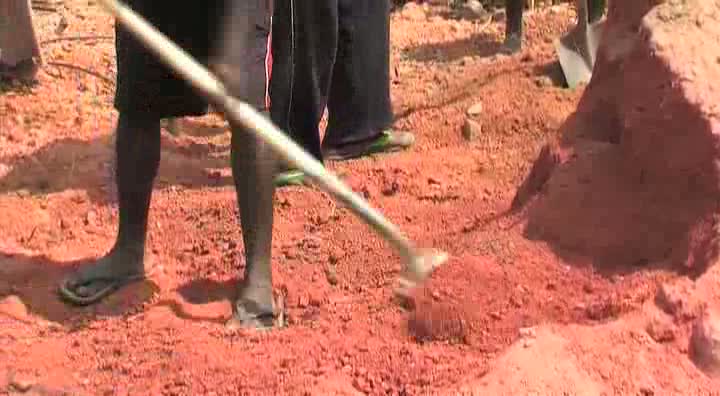- Text size
 |
|  |
|  |
| 
- Français
Ivorian refugees call for disarmament, reconciliation and increased grant before return
News Stories, 10 February 2014
PTP REFUGEE CAMP, Liberia, February 10 (UNHCR) – Ivorian refugees living in Liberia have called for the disarmament of former fighters, stronger efforts at national reconciliation and an increase in the repatriation grant, saying this would encourage more returns to Côte d'Ivoire.
Although UNHCR is facilitating the voluntary repatriation of Ivorian refugees, more than 52,000 remain in four camps and various communities in Liberia. Some 220,000 Ivorians fled to Liberia three years ago following a disputed presidential election in late 2010 that led to fighting between supporters of poll rivals, Laurent Gbagbo and Alassane Ouattara.
"We want to return home, but we do not want to have cause to run away again," Guie Patrice Gnomble, a refugee leader at the PTP Refugee Camp in eastern Liberia, told a large group of visiting diplomats and international aid workers earlier this week. "We are appealing for the disarmament of all fighters [in Côte d'Ivoire], including the donsos [local militia]," he added.
The visit, organized by UNHCR, was aimed at giving the dignitaries a clearer idea of the situation inside the camps and to hear from the refugees about the challenges they face, including a looming food crisis.
In Little Wlebo Refugee Camp, refugee spokeswoman Elisabeth Kouya Nogbado told the visitors that the refugees wanted an increase in the repatriation grant that they receive on arrival in Côte d'Ivoire. Adults receive US$150 from UNHCR, while those under 18 receive US$100. She said the money was needed to give them a better chance of reintegration. She also asked that educational qualifications acquired by refugees in Liberia be recognized in Côte d'Ivoire.
But some refugees said they would not return to their homeland until after the presidential and parliamentary elections scheduled for 2015. "We ran to seek refuge in Liberia as a result of post-election violence. I will not return until peaceful elections are held," said 30-year-old refugee, Blaise. Ivorian refugees also raised concerns about land disputes at a meeting last October in the eastern Liberian town of Zwedru of more than 100 traditional chiefs and elders from Liberia and Côte d'Ivoire.
President Alassane Ouattara and other top Côte d'Ivoire officials, including Ambassador Kapieletien Soro during last week's visit, have urged the refugees to return home and reiterated that peace and stability had been restored to their country. Last year, UNHCR organized "go-and-see" missions, during which refugees visited Côte d'Ivoire to see the conditions back home. "Come-and-tell" missions were also organized for former refugees to visit Liberia and inform refugees about peace, reconciliation and reconstruction efforts back home.
Meanwhile, UNHCR continues to help the neediest refugees on a budget that has been reduced at a time when the refugee agency is also busy with emergencies in places like Syria, South Sudan and Central African. The refugee agency is helping refugees engaged in livelihood activities, including the growing of crops and poultry rearing.
"We are doing all we can to assist Ivorian refugees to return home and rebuild their lives," said Khassim Diagne, UNHCR's representative in Liberia. "In 2013, we repatriated 18,273, exceeding the 16,000 repatriation target for the year. For 2014, we are stepping up our collaboration with Ivorian authorities to ensure that refugees have more objective information about their areas of origin that will enable them to make informed decisions about return."
The governments of Liberia, Côte d'Ivoire and UNHCR will be meeting in the coming weeks in the Ivorian capital, Abidjan, to discuss the repatriation and the concern of the refugees.
By Sulaiman Momodu in Monrovia, Liberia


